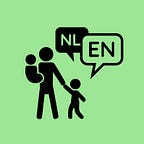When are you bilingual?
If you google bilingualism -or multilingualism-, you will find that there are more people who speak multiple languages, than people who only speak one language. Especially in Africa it seems that speaking two, or even three or four languages is quite common. In Europe, a lot of people can also speak English. If I ask around though, not a lot of people consider themselves bilingual. So what is it that makes a person, a bilingual person?
When I did a course on multilingualism for my work, we were asked the question “Are you bilingual?”. In a group of 20 people, only two said they were and talked about their German and Turkish upbringing. Even though the other 18 of us could speak both Dutch and English we somehow collectively decided we were not bilingual, and even I did not raise my hand. Somehow, the languages we had learned as teenagers in school didn’t seem to matter. After some debate and consideration, more and more questions arose.
- Am I bilingual if I have a dialect?
- Am I bilingual if I understand but don’t speak the language?
- Am I bilingual if I cannot read or write in the language?
- Am I bilingual if I didn’t learn it as a baby/child?
- Am I bilingual if I am not fluent?
- Am I bilingual if I watch TV without subtitles?
These questions are an example of how difficult the division between monolingual and multilingual can be made. While some people will say “no” to a lot of these question, others may say “yes”. There are many different definitions, and many more different opinions. For example, the Oxford dictionary says you need to “speak two languages fluently” while the Cambridge dictionary states you need to be “able to speak or use two languages”. Comparing these two, do you need to be fluent or just able to use it? And what is even the definition of fluent, or of a language? I have heard people say you are bilingual only if you grew up with two languages, and I even heard someone say that “as long as you believe you are, you are bilingual”.
From an SLP point of view there is a different definition for (young) children and adults:
Children are considered bilingual if they grow up in an environment of two languages (or dialects).
Adults are considered bilingual if they communicate in two languages (or dialects) for a significant part of their daily life.
The reason why children don’t have to communicate in the two languages in order to be bilingual is simple. Young babies are not yet able to speak at all, let alone read or write. With children learning a second language after the first one, a silent period is often seen as well.
For grownups however, communication is key. You don’t need to be completely fluent as long as you can make yourself understood without difficulty. Also, both languages need to be part of your daily life.
So a child whose father speaks language A to him, and whose mother speaks language B to him is bilingual. And an adult who speaks language A at work and speaks language B at home is also bilingual. But where is the line between bilingual and monolingual? Consider this example:
If your grandma talks to you in language A, and you talk back in language B and so forth. You both understand each other but can only speak in one of the languages. Are you bilingual? Following my definition, they are. Although this ‘non-speaking bilingualism’ is pushing the limit, they are communicating. (More on this specific form later…)
And then, does watching television without subtitles or reading a book in a different language make you a bilingual person? Again, communication is key here. Although it is certainly impressive to do so, you are not communicating and therefor I would not see you as bilingual.
So what do you think it means to be a bilingual?
Let me know and thanks for reading!
Originally published at https://intentionallybilingual.weebly.com
